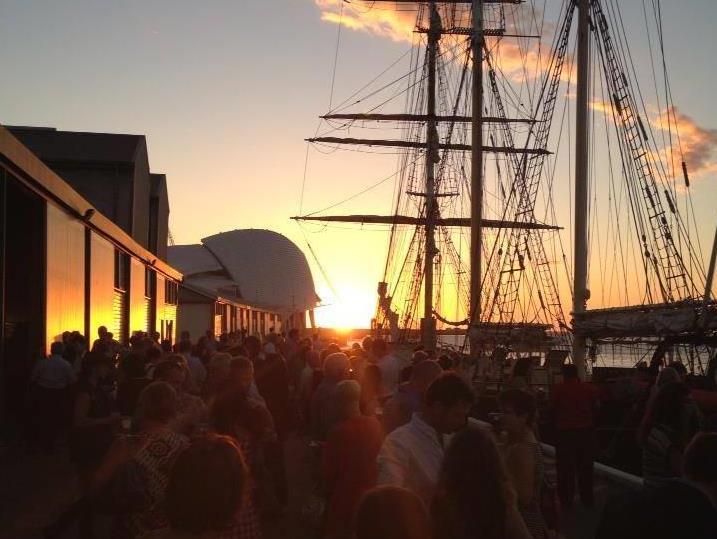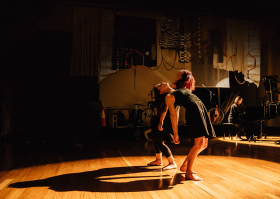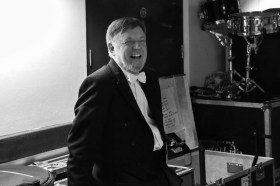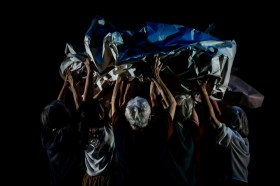Guests enjoy sunset at over Fremantle Port during intermission.
The tall ships moored alongside the quay, the evening sky, the cry of seagulls and aroma of fried sausage provided an relaxing prelude to the Perth Chamber Orchestra’s concert in B-Shed, Fremantle Docks.
The major work on the program was Beethoven’s 7th Symphony. No other composition by Beethoven is so intensely driven by the power of rhythm as his Seventh Symphony and the string section of the orchestra, led by Paul Wright, responding to the challenge with precision, power and bite. Out of the opening ascending scale pattern Stephanie Nicholls’ dolce oboe soared over the orchestra. But from then on the woodwind took a back seat, offering gentle contrasts to, and respite from, the driving strings; or perhaps a trade-off because a more penetrating woodwind section would have added to the “noise” of an already over-lively acoustic.
It was a shame the dark melodic beauty of the opening bars of the Second Movement were marred by a ferry berthing outside the shed, its reverse gear pitched in or around the complementary key of A minor. This distraction ended, conductor Jessica Gethin drew music of aching beauty from the orchestra, the opening bars combining with a yearning phrase of violas and ‘celli, these two figures interweaving and finally, expanding to include the full orchestra, the movement ending with rapturous sigh of the violins.
Having set a cracking pace in the opening movement, one wondered what Gethin would make of the fourth, renowned as “the apotheosis of the dance”. For pace we were not to be disappointed. However, in the B-shed acoustic the hectic tempo tended to obscure the rapid articulation that can make this sort of playing so exciting. The woodwind brought some pause, in further contrast to the dominant whirling rhythms, before the tutti led to an exhilarating conclusion and the capacity audience to its feet.
Now we come to Bela Bartok. Not a composer the writer feels comfortable with. His writing is based on Hungarian and Eastern European folk melodies and rhythms which in his hands fall less happily on my ears. Bartok’s 22 Duets for Violin were composed as student works, starting with the simplest and working their way up in degrees of difficulty. The PCO arranged ten of these miniatures for various combinations of violins, violas and cellos and cleverly placed the players in and around the audience. The trick of playing duets is to match technique, tone quality and balance and the string section of the PCO addressed these challenges with confidence and attack. High point was perhaps No 28 of the series, “Sorrow” for four violins. Several of the pieces were identifiably rustic folk dances. Again, rhythm seemed key to their success. No 22 Transylvanian Dance with its energetic pulse brought the set to a fiery and exciting close. These duets were easy to digest and made Bartok sound entertaining. One hopes the PCO will roll them out from time to time.
Likewise music for the cimbalom, which opened the concert. Joshua Webster, who won a scholarship in 2009 to study the instrument in Hungary, was the soloist in ‘Altered Illustrations’, a work for cimbalom and orchestra composed by Kevin Penkin, who writes music for video games, a genre that I had not thought existed before. Perhaps unfairly, one anticipated something ghastly but in the event the music was extremely beautiful. The work opened softly as if a rippling stream building to a climax based on the cimbalom’s lower register. Again there was rhythmic precision but beyond that I can’t say because, from where I was sitting, the sound of the cimbalom was too often lost in the orchestral tutti. Let us hope we will hear the work again in a more astringent acoustic. With two dedicated cimbalom practitioners in Perth, it seems likely we are going to become familiar with the instrument and, indeed, folk music from Eastern Europe as a whole. Our European culture has in truth been largely Western European. Surely it is time to embrace our Eastern brethren as cultural partners, despite the misgivings of this reviewer.
4 stars out of 5
Perth Chamber Orchestra
Conductor: Jessica Gethin
Music Director: Paul Wright
B-shed, Fremantle Docks, 9 December 2013





